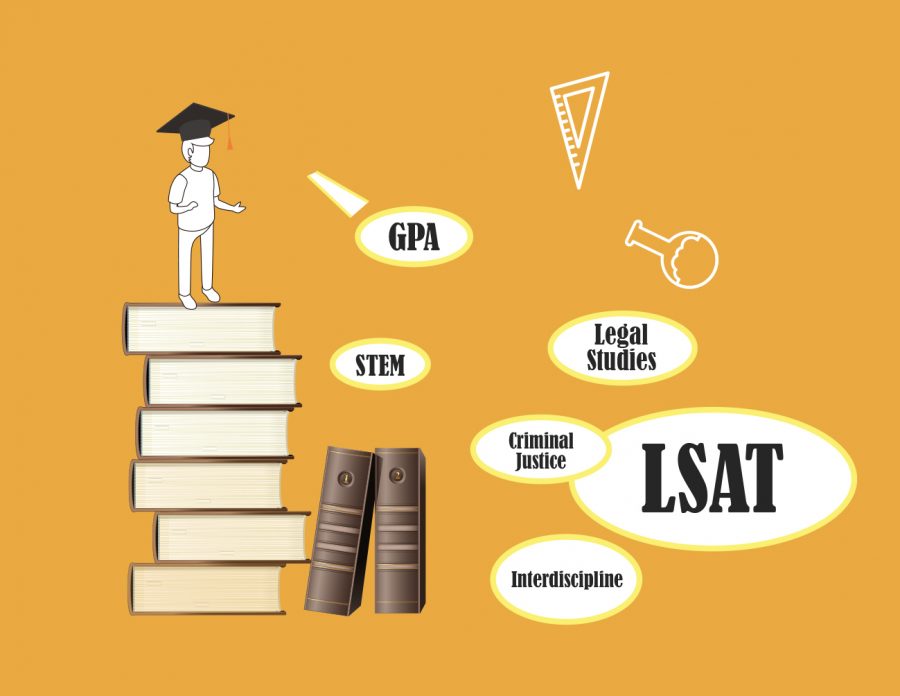OPINION: Pre-law students need interdisciplinary focus to be competitive
Having specialized knowledge may be mandatory in future
FEIRAN ZOU | DAILY EVERGREEN ILLUSTRATION
Pre-law students are expected to know more than just law. Students should have knowledge of politics, learn a second language and have a basic understanding of technology and fields like forensics.
November 22, 2019
Thousands of students across WSU are preparing to go to law school. Economics students are poring over financial law, political science students are revisiting obscure court cases and philosophy students are engaged in ethical dilemmas about the injustices of the court system.
Regardless of their major, WSU pre-law students are receiving a comprehensive, multidisciplinary education in the various doctrines that will help them become better lawyers, judges and prosecutors.
But it is not enough. The traditional image of a courtroom in media is a far cry from a 21st-century courtroom. Trials can stretch for days, months and even years, while a particular fact is disputed.
Evidence, both damning and exonerating, is stored digitally, requiring specialists to unlock and read said information. Hundreds of languages are spoken in U.S. courtrooms every day, and millions of pages of obscure tax law and economic theory are parsed through.
It’s no longer enough to be Atticus Finch or Saul Goodman, with the power of truth and justice on your side. Modern day lawyers must be prepared to study increasingly obscure and technical literature, in order to truly understand their clients’ situations.
This is where current pre-law programs may start to fail students, and where aspiring, driven undergraduates may have to forge their own path. To determine what skills will help create a well-rounded applicant, we must examine the fields and disciplines that lawyers and paralegals face in today’s modern courtroom.
“Even President Trump’s Twitter account […] constitutes as an actor in the political system between Congress and the judicial branch,” said Kevin Kissinger, a WSU senior political science major who plans to become a judge. “It’s just another avenue and outlet for political discourse and discussion.”
A second language, like Syrian, Arabic, Farsi, Spanish or Somali could become required for lawyers, especially for those pursuing immigration or human rights law. A knowledge of Russian or Chinese would be helpful for national security or military lawyers, and corporate and tax lawyers will benefit from a knowledge of an economically viable language, like Korean, Chinese or German.
Basic technical competency is also a must for lawyers, but sometimes even that may not be enough. Forensic and technical consultants are constantly utilized by various national security agencies (FBI, NSA, DEA, etc.) when investigating cybercriminals. A pre-law student with some coding or mathematics courses as a secondary skill will stand out.
A knowledge of economics is also helpful for lawyers, especially those practicing corporate or tax law. Big businesses and law firms work hand-in-hand every day, and incredibly ludicrous contracts and retainers are available, for pre-law students willing to roll up their sleeves and study economics, accounting or business.
“The track I set myself up for is a joint degree program, which allows you to get your JD [juris doctorate] as well as your MBA [master of business administration],” said ASWSU Vice President Jhordin Prescott, a junior political science major planning to study corporate law. “Going into a law program, or trying to certify in a specific field, you definitely have to do your research beforehand.”
None of this is to say WSU’s pre-law program is not adequately preparing its students for law school. In fact, both Prescott and Kissinger believe in the benefits and diversity of the pre-law track.
“A strength of the pre-law track is the variety of courses you take,” Prescott said. “You take courses a criminal justice major would take or that a philosophy major would take. I think that the track allows you to see different views of law from different majors.”
Instead, students should know a diverse education is much more desirable in 2019. When applying for law school, studying for the LSAT or interviewing for a job as a lawyer. Schools and firms will value the various secondary skills a student may have, and new fields of law can open up based on particular skills that may not immediately come to mind.
So, pre-law majors, take that Spanish class or that accounting class or that programming class. It may not be immediately obvious, but the skills you acquire in addition to the tenets of the pre-law track can only make you more marketable as one of America’s newest lawyers.









